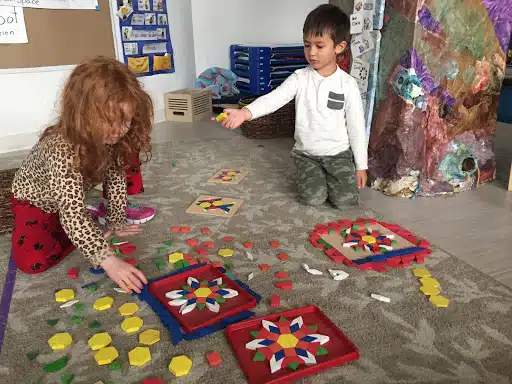Article At A Glance:
- Activities like drawing, finger painting, and zippers and buttons enhance precision and skill.
- Play-based activities such as using Legos, chopsticks, or sticker books make learning engaging and fun.
- Strength-building exercises with Playdough, scissors, and heavier objects prepare kids for fine motor control tasks.
- Games like block stacking, puzzles, and board games promote bilateral coordination and refined motor skills.
Watching children beam with pride after mastering a skill like zipping a jacket or writing their names is a memorable moment for parents. The development of these skills doesn’t happen by accident, though. Fine motor activities for preschoolers play a crucial role. Providing these at home and during preschool can help them develop their sensory-motor skills. Learn more about what you can do with your child to encourage them.
Fine Motor Activities for Toddlers and Preschoolers That Can Develop a Variety of Skills
Fine motor activities for preschoolers can involve things that children love to do already. When kids have fun, they won’t even realize they’re developing essential fine motor skills. Learn more about some simple, enjoyable activities that you can use to help your children and how they help their long-term development.
Draw, Color, or Write
Using crayons to draw freely on paper or to color in a coloring book is a fun way to help children learn to grasp items and apply the proper pressure. In addition, learning to draw can create confidence with other fine motor skills.
They may need help at first gripping the crayon properly, but once they learn to hold a pencil or crayon properly, they can begin tracing shapes. This activity prepares the kids to make more complex drawings later.
After they develop some other drawing skills, learning to write letters and numbers is a logical next step. For example, students may learn how to write their names.
Giving older kids dot-to-dot pictures to complete is an excellent way to enhance fine motor skills, although kids need to be able to count and recognize numbers for this activity.
Finger Paint
When you want fun fine motor activities for preschoolers — and you don’t mind a little mess — finger painting is a great way to start. Finger painting is one of toddlers’ simplest activities when developing fine motor skills.
Kids work on developing hand-eye coordination when finger painting. They also learn precision while removing different amounts of paint from the jar with their fingers.
Practice With Buttons and Zippers
Consider doing practical activities that are still fun. For children to learn to dress themselves, practicing activating a zipper or manipulating buttons is vital. Such tasks require the development of fine motor skills.
Rather than handing kids a piece of clothing and repeating the zipper or button process, try to make the learning process fun. Have a child work on dressing a doll with buttons and zippers. You can also create boards with rows of zippers and buttons to help kids practice the skills repeatedly.
Using large zippers and buttons can help the child achieve the motor skills required. As they gain more confidence, you can move to smaller items that require a little more precision.
Play With Tongs, Clothespins, or Chopsticks
Using tongs can be a fun and great way to improve their fine motor skills. With tongs, children must use their entire hand to pinch the ends. They can learn to pick up small items and move them from one place to another. As they master this tool, you can switch to more miniature tweezers to help them fine-tune their precise manipulation skills.
One of preschoolers’ more advanced fine motor activities is manipulating items like clothespins. The child has to pinch one end of the clothespin with fingers to secure the unit on a piece of paper or cardboard, which requires precise finger movement.
It may seem like chopsticks are highly advanced for kids to use. However, they’re great for managing finger pressure and can help enhance dexterity and control through practice. You can use chopsticks of different diameters and lengths to help the kids succeed more.
Play With Legos and Duplos
Some fine motor coordination activities for toddlers and preschoolers are interlocking building blocks like Legos and Duplos:
- Legos: Legos help older preschool children learn to grab small items precisely. They have to use their fingers to manipulate the orientation of the Lego bricks to make sure they connect correctly. They also develop hand strength and bilateral coordination by using both hands to connect two bricks. You do have to be careful with Legos, as they are small enough to be a choking hazard for young children.
- Duplos: Duplo blocks work nicely for toddlers and kids just learning how to manipulate these blocks. They’re twice the size of Lego bricks, which can make it easier for young children to manipulate while connecting them. The size of Duplos allows kids to have fun, even when they have less coordination and refined fine motor skills.
Additional Read: Spatial Awareness Activities for Smooth Moving
Activities That Focus on Improving Precision
The importance of fine motor skills can’t be understated. Sometimes, however, you need to go beyond the basics. These activities, in particular, can help improve precision:
- Button sorting: Picking up buttons and sorting them by color or size can help children develop the ability to move items precisely. They must pick up one button at a time and carefully place it in the correct location. You also can refine this skill with coins of varying sizes.
- Cereal or bead stringing: Learning to slide a piece of cereal with a hole in it onto a string involves making precise movements. You can use Cheerios, Froot Loops, or Apple Jacks. Toddlers also need to concentrate as they create color patterns with the cereal. As the children gain confidence with the cereal, they can advance to smaller beads. However, pay attention while using these because they represent a choking hazard.
- Sticker books: Give young children a sheet of stickers and let them apply the stickers in a precise location on a paper or book. Kids have to grip the sticker carefully before using hand-eye coordination to place it in the proper location.
Activities That Focus on Improving Strength
Some fine motor activities for preschoolers help strengthen the child’s fingers and hands. Consider deploying the following activities to give your young children the confidence to grasp, manipulate, and lift small items:
- Grasping heavier items: Place multiple items on a table or in a bin. Ask the children to select all the items that are a specific color. If the items have varying sizes and weights, kids will develop strength in their hands and fingers to grip the different items securely.
- Playdough or clay: Clay and Playdough activities allow children to change the shape of the material. They must use finger muscles to manipulate the soft material into the desired shape.
- Scissors: Give small children toddler-safe scissors and let them snip and cut scrap paper to enhance the strength of their hands and fingers. Allowing them to cut the paper into any shape is fine for developing strength in the fingers. As they gain confidence with the scissors, have them start cutting along lines to create specific shapes and develop precise fine motor skills.
Fine Motor Games
For older children at your preschool, developing bilateral coordination is essential. With bilateral coordination, children learn to move both hands together. This is critical in gaining body strength, coordination, and fine motor skills. Some of the fine motor activities you can deploy for bilateral coordination for kindergarten and preschool students will resemble games. They can include:
- Block stacking: Stacking blocks requires grasping the blocks and balancing them precisely and firmly. You can make a game out of it by seeking how high the kids can stack the blocks.
- Board games: Simple board games can help young children develop fine motor skills. Even a simple game like Candyland helps kids learn to pick up cards from a pile before moving a marker to a specific location on the board.
- Puzzles: Jigsaw and block puzzles are fun for toddlers, but they also can help with gaining fine motor skills. The kids have to manipulate the orientation of each piece to ensure that it fits in the proper location.
- Stacking cups: Children can use plastic cups and work at stacking them as high as possible. Controlled movements are necessary to place the cups in the proper location. If the child goes too fast or uses too much force, the cups will crash to the ground.
Trust Bubbles Academy for Activities Your Preschoolers Will Love
The importance of fine motor activities for preschoolers is evident. Improving hand-eye coordination and grasping skills can help toddlers and preschoolers develop intellectual and physical skills. At Bubbles Academy, we create fun activities for your preschoolers and toddlers that can improve their fine motor skills at the same time. Our preschool programs allow children aged two through five to learn and explore.
To register your child for a free class or to ask us any questions, call Bubbles Academy today at (312) 944-7677. Reach out to us today.

